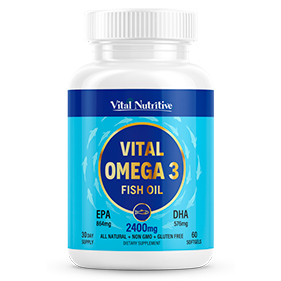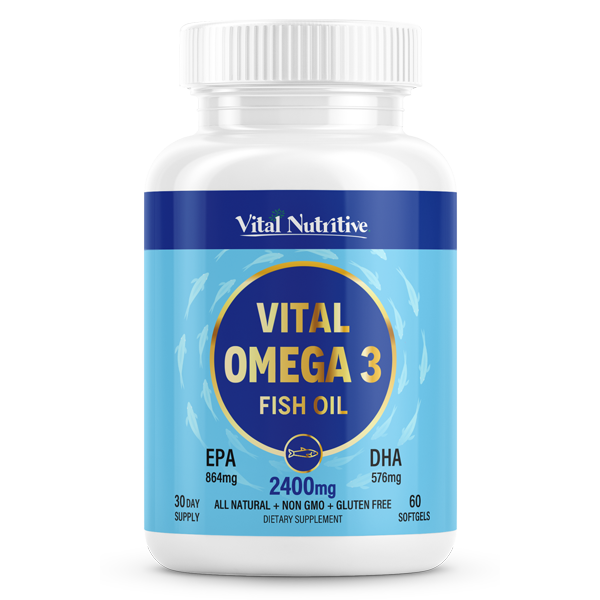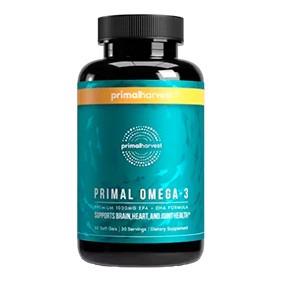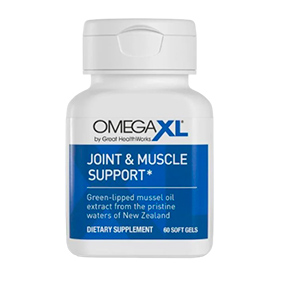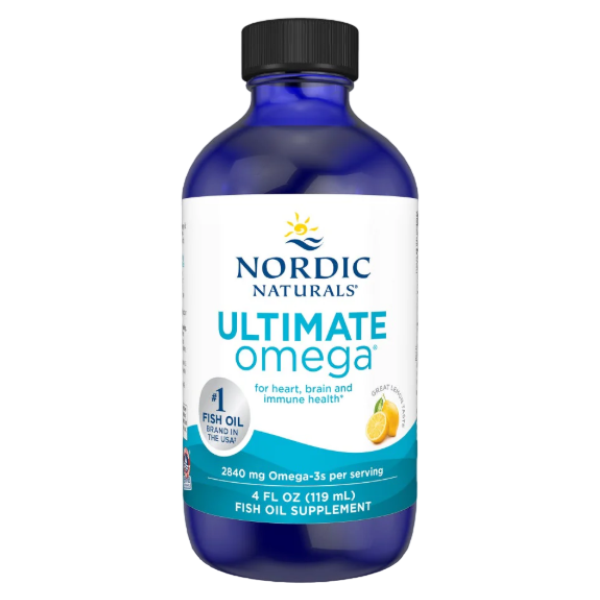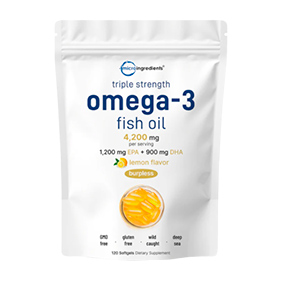Best Omega-3 Fish Oil Supplements 2025 Buying Guide
Choosing the best omega-3 supplements can be overwhelming, especially with so many fish oil supplements claiming to offer maximum purity and potency. That's why we carefully analyzed dozens of the top options on the market to determine which formulas truly stand out in 2025. Our in-depth analysis focused on ingredient quality, sourcing methods, absorption rates, customer reviews, and real-world effectiveness to help you make a confident and informed decision. Whether you're looking for heart support, joint wellness, or cognitive clarity, our guide highlights the omega-3 supplements we believe offer the best value, performance, and reliability this year.
Our Pick For The Best Omega-3 Fish Oil Supplement in 2025 : Vital Omega 3
Among the many omega-3 supplements available today, Vital Omega 3 by Vital Nutritive sets itself apart with a formula that checks every box—potency, purity, effectiveness, and value. With 1,440 mg of total omega-3s per serving, including a high concentration of EPA (864 mg) and DHA (576 mg), it delivers clinically supported levels that help promote cardiovascular, cognitive, joint, and eye health. The source—high-quality anchovy oil—ensures clean, reliable absorption without unnecessary fillers or additives.
What truly makes this product stand out is its balance of performance and experience. While many fish oil supplements suffer from unpleasant taste or digestion issues, this formula is naturally flavored with lemon to avoid the fishy aftertaste. Its clean label—free of gluten, sugar, trans fats, and artificial ingredients—makes it suitable for long-term, daily use by health-conscious adults, especially those over 40 looking to stay active, focused, and well-supported.
Finally, Vital Nutritive earns our top spot because it offers all these benefits at a price that’s remarkably accessible. It’s rare to find a supplement that combines premium quality with such strong value, but Vital Omega 3 delivers—with free shipping, a 60-day money-back guarantee, and bundle savings of up to 65%. For those seeking a smart, dependable way to prioritize their health in 2025, this is our top pick.
What are the main benefits of omega-3?
Omega-3 supplements are essential for maintaining long-term well-being thanks to their wide range of health-promoting properties. These healthy fats, sourced primarily from cold-water fish, are a cornerstone of premium fish oil supplements. They play a key role in heart health, helping to maintain healthy cholesterol levels, supporting normal blood flow, and promoting cardiovascular function, making them a popular daily choice for those concerned about cardiac well-being. As noted in "Omega-3 in fish: How eating fish helps your heart" (Mayo Clinic), omega-3 fatty acids may lower inflammation in the body, which can benefit heart health.
In addition to their positive effect on the heart, omega-3 supplements are valued for their impact on brain health and cognitive function. DHA, one of the most important forms of omega-3, is a structural fat found in the brain and eyes. Therefore, consistent use of fish oil supplements can promote increased mental focus, improved memory, and a balanced mood. Many people turn to omega-3 supplements not only for their physical benefits but also to maintain mental clarity and emotional well-being.
Another key reason fish oil supplements are so popular is their potential to support joint flexibility and reduce inflammation. Omega-3 supplements can help relieve occasional joint stiffness, making them ideal for those with active routines or aging joints. According to "Do Omega-3s Help Arthritis?" (Cleveland Clinic), studies have found that people taking fish oil supplements or eating more fatty fish have less morning stiffness, joint stiffness, and pain. Thanks to their ability to boost immune health and contribute to skin and eye health, omega-3 supplements remain one of the most trusted and recommended wellness tools on the market.
What foods contain Omega 3?
Omega-3 fatty acids are found in a variety of foods, but some sources are significantly richer and more bioavailable than others. Cold-water fatty fish, such as salmon, sardines, mackerel, anchovies, and herring, are among the best natural sources of EPA and DHA, the most beneficial forms of omega-3 for heart, brain, and joint health. These are the same forms often used in high-quality fish oil supplements and omega-3 supplements, making fish consumption a dietary cornerstone for those looking to naturally increase their omega-3 intake. As noted in "Omega-3 in fish: How eating fish helps your heart" (Mayo Clinic), fatty fish contain the most omega-3 fatty acids and seem to benefit the heart the most.
In addition to fish, certain plant-based foods also contain omega-3s, although primarily in the form of ALA (alpha-linolenic acid), which the body must convert into EPA and DHA in small amounts. Flaxseeds, chia seeds, walnuts, and hemp seeds are good vegetarian sources of ALA. While they are valuable additions to any balanced diet, the omega-3s found in plant-based foods are typically less potent, so many people still turn to omega-3 supplements for a consistent, concentrated supply.
Other sources include algal oil, a vegan alternative that directly contains DHA, and fortified products such as omega-3-enriched eggs, yogurt, and milk. However, since it can be difficult to obtain high levels of omega-3s through food alone, especially in the most beneficial forms for the body, many health-conscious people choose to incorporate fish oil supplements into their daily routine for more reliable coverage.
Why is it good to use Omega-3 Fish Oil supplements?
Using omega-3 supplements, especially high-quality fish oil supplements, is a practical and effective way to ensure your body gets the essential fatty acids it needs for optimal function. While omega-3s are found in certain foods, many people don't meet the recommended intake due to dietary limitations or lifestyle factors. Fish oil supplements help fill this nutritional gap by providing concentrated amounts of EPA and DHA, two forms of omega-3s that support heart health, brain function, joint mobility, and overall well-being.
One of the main advantages of fish oil supplements is their consistency. With each serving, you get a reliable dose of omega-3s that can support cardiovascular function, maintain normal triglyceride levels, and promote mental clarity and focus. This level of control is difficult to achieve through diet alone, especially if you don't regularly consume oily fish or follow a plant-based diet.
Additionally, omega-3 supplements are often purified and tested for heavy metals and contaminants, offering peace of mind and additional wellness benefits. Many formulas are also designed to reduce fishy aftertaste or digestive discomfort, making them easy to incorporate into your daily routine. For those seeking long-term health in a simple and manageable way, fish oil supplements offer a reliable solution.
What to look for in Omega-3 Fish Oil supplements?
-
Omega-3 Content and Form
Look for supplements that clearly state the amount of EPA and DHA per serving, as these are the most beneficial types of omega-3s. The best fish oil supplements use the triglyceride form, which is more easily absorbed by the body compared to synthetic ethyl esters. A high concentration of EPA and DHA helps support heart function, joint flexibility, cognitive health, and immune balance more effectively.
-
Sourcing and Purity
Choose omega 3 supplements made from wild-caught fish like anchovies, sardines, or mackerel, ideally from clean, cold waters such as those near Norway or Alaska. The product should be third-party tested for heavy metals and toxins to ensure it’s safe and pure. Sustainable sourcing and certifications from organizations like Friend of the Sea or IFOS are also strong indicators of product integrity.
-
Absorption, Taste, and Tolerability
Quality fish oil supplements should be easy to digest, with enteric coatings or natural flavoring (like lemon) to reduce fishy burps or aftertaste. Some formulations also include antioxidants like vitamin E to preserve freshness. A well-formulated supplement should be convenient to take daily, without causing discomfort, so you can stay consistent and enjoy the full range of benefits omega-3s have to offer.
What to avoid in Omega-3 Fish Oil supplements?
-
Low EPA and DHA Levels
Some fish oil supplements may boast high omega-3 content but actually contain low levels of EPA and DHA—the most beneficial forms for heart, brain, and joint support. Always check the label to confirm how much of each you’re getting per serving. Avoid products that don’t break down these values clearly, as they may be less effective.
-
Unverified Purity and Sourcing
Avoid omega 3 supplements that don’t disclose their fish source or fail to mention third-party testing. Poor-quality fish oil may come from contaminated waters or include traces of heavy metals, PCBs, or other toxins. Steer clear of supplements without certification or transparency, and look for products made from wild-caught, sustainably sourced fish with lab-tested purity.
-
Artificial Additives and Poor Taste
Low-grade fish oil supplements often contain artificial preservatives, colors, or fillers that add no health value and may irritate sensitive stomachs. They also tend to have a strong fishy aftertaste or cause unpleasant burps. Opt for supplements with natural flavoring or enteric coating to enhance your experience and improve digestibility.
References:
- Abdelhamid, A. S., Brown, T. J., Brainard, J. S., Biswas, P., Thorpe, G. C., Moore, H. J., ... & Hooper, L. (2018). Omega-3 fatty acids for the primary and secondary prevention of cardiovascular disease. Cochrane Database of Systematic Reviews, (11). DOI: 10.1002/14651858.CD003177.pub3
- Gómez-Pinilla, F. (2008). Brain foods: the effects of nutrients on brain function. Nature Reviews Neuroscience, 9(7), 568–578. DOI: 10.1038/nrn2421
- Calder, P. C. (2010). Omega-3 fatty acids and inflammatory processes: from molecules to man. Biochemical Society Transactions, 38(1), 211–219. DOI: 10.1042/BST0380211
- Swanson, D., Block, R., & Mousa, S. A. (2012). Omega-3 fatty acids EPA and DHA: health benefits throughout life. Advances in Nutrition, 3(1), 1–7. DOI: 10.3945/an.111.000893
- Bays, H. E. (2006). Safety considerations with omega-3 fatty acid therapy. The American Journal of Cardiology, 98(4A), 35i–42i. DOI: 10.1016/j.amjcard.2006.03.014
Advertiser Disclosure: We independently research, review, and recommend the best products. Our articles are reviewed by healthcare professionals to ensure medical accuracy. Please note that we do not review all products in a given category. All opinions expressed on this site are our own. Our rankings are based on an analysis of brand customer reviews, product quality, the merchant's customer service levels, prices, special offers, popularity trends, and more. When you purchase through our links, we may earn a commission. Company listings on this page DO NOT imply endorsement. We do not feature all providers on the market. Except as expressly set forth in our Privacy Policy.




